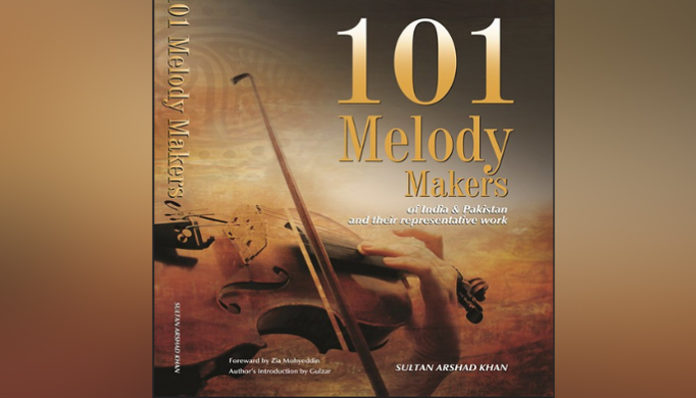Sultan Arshad Khan’s name is synonymous with music history in Pakistan. He is known as the foremost authority when it comes to film music and has dedicated his life to promoting it in the country. A book about the many music composers in India and Pakistan was due from him for a long time, for he had spent time with many of them during the last sixty years. Thankfully, he managed to compile his memories and knowledge in the form of a book and released it last month as ‘101 Melody Makers of India & Pakistan and their representative work’.
The coffee table book might be priced high at Rs. 13,500, but it is for those who prefer quality knowledge over too much and incorrect knowledge. Just look at the names that have written the foreword and the introduction, and you will understand the kind of stuff you will get into, if you purchase the book. The foreword has been penned by Pakistan’s most popular theatre actor legendary Zia Mohyeddin while the Author’s Intro has been done by none other than renowned filmmaker and poet Gulzar, adding weight to the already heavy collection.
What makes this compilation different from the other books in the market about music composers is that it treats them with respect, not as people who came and went after ruling the airwaves. Unlike the other ’Melody Makers of the Subcontinent’ book by Dr. Amjad Parvez, this one deals only with renowned music composers who made melodies for films, and ranks the best 101 but in alphabetical order. Dr. Parvez’s book was more like a recollection of his memories rather than a compilation, whereas this book gives ample space to the 101 Melody Makers it mentions.
From Pakistan’s Khawaja Khursheed Anwar to A. Hameed, Sohail Rana to Robin Ghosh, or India’s SD Burman and RD Burman, every music composer is discussed at length within these pages. When did they begin their careers, who were their most frequent collaborators, what made them click in the first place is followed by a selected songography of each and every music composer. That’s not all, colored posters of the films these music composers were part of as well as memorable pictures from the author’s collection is what stands out in this heavily illustrated collection.
The Composers are also divided into two parts – Part 1 and Part 2, to keep it simple for the readers. You can pick your favorite music composer and start with him, or can start from the beginning with A and end with Z, depending on your choice. Interesting incidents that shaped up these music composers’ careers are mentioned in the narration that takes as much space in the book as do the list of songs/movies composed by the subject.
For a music lover who listens to songs on merit and not differentiates them as old or new, Sultan Arshad’s book comes out as a breath of fresh air. The author didn’t just research and pen his thoughts for the sake of coming up with a book, there’s a method in his madness, a journey behind his accomplishment. Very rarely (or hardly) you come across a mistake within these pages and one must compliment Atlantis Publications for bringing the musical history of the subcontinent films in the form of a guide that will stay relevant for a long time. Why? Because hardly any music composer from the current era is likely to earn a place amongst the Top 101 Melody Makers from India and Pakistan, adding life to this edition, automatically.
If there was no way for you to confirm whether Aisa Bhi Hota Hai was Nisar Bazmi’s debut flick in Pakistan or who was the composer behind Nazrul Islam’s Zindagi, this book would confirm it for you. It also clears many misconceptions about Indian films, and you will have to read it to know it. After all, credible information is hard to find in the era of Social Media and Wikipedia, and a lot of unverified details are available on the Internet. This book pledges to render such web pages obsolete with the abundance of lesser known facts and details that have reached the author from the subject themselves.
Many anecdotes that you either didn’t know about or didn’t believe make it to these pages, from the personal memories of the author who remains one of the very few Pakistanis who continued to explore film music on both the sides of the Wagah border even after Partition. His personal collection of posters and photographs that make it to this book are not even available in India or in Pakistan, making it a one-of-its-kind kind of a book.
And then there is the list of those who nearly missed the list, but were close enough to their 101 compatriots who made it. This list features many renowned names from both the countries, ranging from Pakistan’s Lal Mohammad – Iqbal to many known film composers in India who couldn’t enter the A list for some reasons. Some of them came, composed and then either vanished or faded away, while many went back to their initial platforms and stayed away from films altogether.
Overall, this book is something every music aficionado should have in his collection, its encyclopedic nature makes it worth your while and money. The ‘Guide to pronunciation of words in Roman English’, as well as the ‘Messages’ from some of the names mentioned in these pages are icing on the cake for both the author, and those who appreciate his efforts to keep film music alive in the region.
